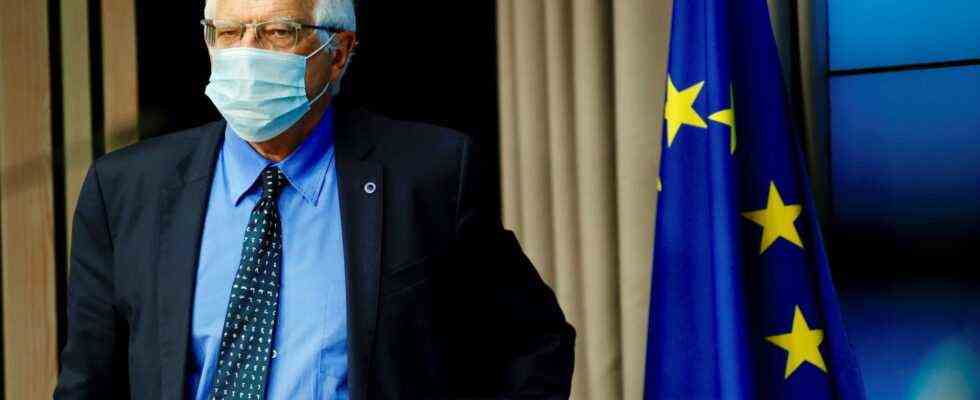Status: 02.09.2021 03:33 a.m.
The foreign and defense ministers of the EU countries are discussing developments in Afghanistan today – and what lessons can be learned from them. EU chief diplomat Borrell calls for a reaction force.
Europe’s defense ministers will probably still have the words of US President Joe Biden in their ears when they come to the Slovenian capital Ljubljana today. Maybe it was a coincidence, but maybe it wasn’t, that exactly one day before the meeting of the Europeans, the American president declared more clearly than ever that an era was coming to an end.
The decision to withdraw from Afghanistan is not just about Afghanistan, said Biden, but about America’s role in the world. “It’s about the end of an era of military operations America wanted to transform other countries.”
European defense experts see this as a wake-up call. “Wake up Europe, your nanny has quit,” commented a top French diplomat on Twitter.
EU reaction force?
EU chief diplomat Josep Borrell wants to discuss a specific consequence of the Afghanistan mission with the defense ministers today: Borrell wants a rapid military reaction force for the EU. The Europeans could have deployed such a reaction force in Kabul, for example, explain Borrel’s staff, in order to further secure the evacuation flights after the Americans had withdrawn.
“The EU must be able to solve such a problem as the airport in Kabul on its own,” stated the security policy expert, Johannes Varwick. “She is currently unable to do that.” According to the political professor from the University of Halle-Wittenberg, there is a lack of joint exercises for such demanding operations. Above all, however, there is a lack of leadership skills. “All of this has to be overcome if Europeans are to be taken seriously in this area.”
Varwick criticizes the fact that the military capabilities of some member states have so far not been better coordinated. According to his observation, the governments are still chasing the illusion that they can get further by going it alone at national level. “The European Union is not susceptible to a crisis. And that has to change quickly because the Americans no longer play the role they played for many years and Europe could, so to speak, make itself comfortable in the shadow of American world politics.” This era also probably ended with the withdrawal from Afghanistan.
Idea is not entirely new
According to the plans of EU chief diplomat Borrell, the rapid reaction force is to consist of 5,000 soldiers. They should be able to be relocated to crisis countries within a short period of time. The idea is not entirely new – the EU already has crisis reaction forces, at least on paper, the so-called battle groups. However, they have never been used.
Borrell’s new attempt is nevertheless not hopeless. Some EU countries, including Germany, had already called for a rapid reaction force to be set up in the spring. However, there was resistance from Poland and the Baltic countries. Eastern Europeans traditionally prefer NATO and regularly react allergic when European military structures are planned independently of the Americans.
Thorough processing required
Nowhere in European policy do desire and reality diverge as widely as in foreign and security policy. Brussels wants to shape geopolitical terms, but according to the assessment of peace and conflict researcher Hannah Neumann, that didn’t even begin to work when it left Kabul. Neumann is a member of the European Parliament for the Greens and calls for a thorough reappraisal. And an answer to the question why not even the few existing military possibilities were used when the withdrawal took place. “Why didn’t we manage to activate the joint evacuation unit that the European Union has in the case of Afghanistan too?” Instead, as the situation in Kabul worsened, the governments acted largely alone.
The Green politician does not find it very credible, however, when the EU is now looking for responsibility for the failure of the Afghanistan mission. “Afghanistan was never a European mission,” she says. “That was a NATO mission in which some European member states took part.” Only smaller police units were European, and anyone who points to the EU during the damage analysis as a member state only wants to distract from their own responsibilities.
“It’s up to the Europeans”
Another explosive question is what the US withdrawal from the role of a global military order force could mean for the security of the Europeans themselves – for example with a view to the armaments efforts of Russia’s President Vladimir Putin. The security expert Varwick does not see the guarantee of assistance from the USA at risk. “But the view from Washington is clearly more towards Asia.” The more the US sees China as the biggest security problem under President Biden, the more security needs of Europeans could move back. And if the Europeans stop doing anything within NATO, Varwick suspects, then the Americans’ guarantee of assistance will also become less important. “That means: It is up to the Europeans whether the Americans remain involved in European security matters or not.”

